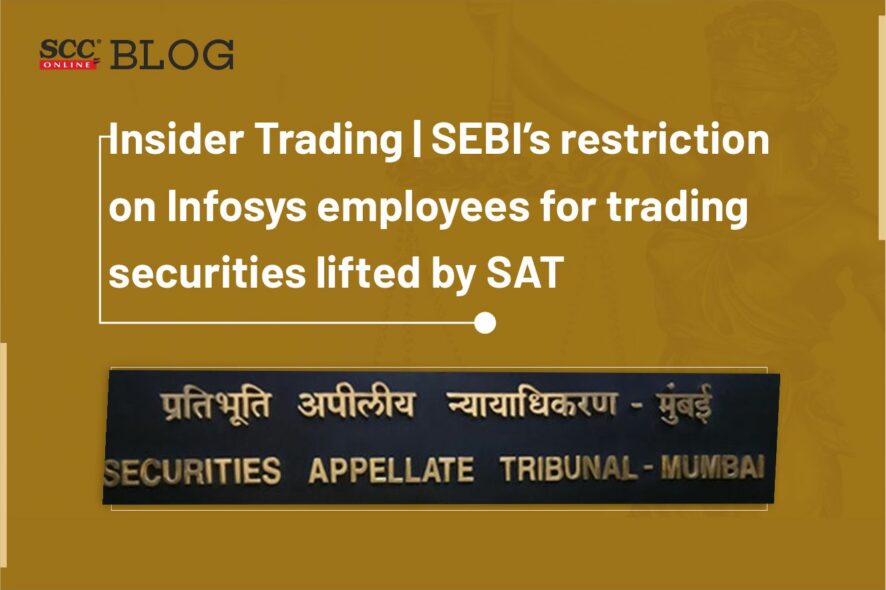Securities Appellate Tribunal, Mumbai (SAT): While lifting the restriction of buying or selling any securities, laid down by SEBI on employees of Infosys for allegedly violating the insider trading regulations, the Coram of Justice Tarun Agarwala (Presiding Officer) and Justice M.T. Joshi (Judicial Member) reiterated the settled law that burden of proof is always upon the prosecution, SEBI to prove that he had access to UPSI.
Instant appeal had been filed questioning the confirmatory order confirming the ex-parte ad-interim order whereby the appellant was restrained from buying or selling any securities, either directly or indirectly, till further orders.
Factual Background
SEBI had conducted an examination in respect of the trading activities of two partnership firm – M/s Capital One Partners and M/s Tesora Capital in the scrip of M/s Infosys Ltd.
Prima Facie it was observed that corporate announcement of audited financial results was made by Infosys on 15th July, 2020. The information relating to the financial results was an Unpublished Price Sensitive Information (UPSI) which came into existence on 29-6-2020 and came to an end on 15-7-2020 when the results were announced.
Further, it was found that the appellant was a Senior Corporate Counsel of Infosys and, being an officer/employee of Infosys, was reasonably expected to have access to the UPSI and, on a preponderance of probability basis, the appellant was in possession of UPSI and thus, was an insider under Regulation 2(1)(g) of the PIT Regulations.
On pre-liminary examination it was revealed that the appellant was in close connection with another employee Mr Venkata Subramaniam who was a Senior Principal and was designated person who was reasonably expected to and be in possession of UPSI and therefore, Mr Venkata was also an insider.
The appellant was closely connected to Mr Amit Bhutra, who was a partner in Capital One partner and Tesora Capital and passed on the UPSI to his cousin who in turn traded in the scrip of the Company prior to the announcement of the financial results. The examination further revealed that the two partnership firms through their trading had generated proceeds of Rs 279.51 lakhs in Capital Once Partners and Rs 26.82 lakhs in Tesora Capital.
Hence, an ex-parte ad-interim order was passed against the appellant.
Analysis and Decision
The WTM prima facie concluded that the appellant was an insider and since he was working as a Senior Corporate Counsel, he was expected to have access to UPSI or expected to be in possession of UPSI, being a connected person.
In Coram’s opinion, the impugned order confirming the ex-parte ad-interim order could not be sustained for the following reasons:
- Under Regulation 3(5) of the PIT Regulations, 2015 all listed companies are mandated to maintain SD database containing details of all the persons with whom UPSI is exchanged alongwith the date and time stamping and verifiable audit trails. A specific finding has been given by the WTM that the SD data base which captures details of only those designated persons who had direct access to UPSI does not include the name of the appellant or of the designated person Mr. Venkata Subramaniam. Therefore, prima facie appellant 1 and other noticee Mr Venkata apparently did not have direct access to UPSI.
- WTM further notes that there were 600 odd employees in Infosys who were classified as designated persons and further found that such classification as designated persons itself does not mean per se that such designated persons ipso facto were in possession of UPSI coupled with the fact that Mr. Venkata’s name was not found in the SD data base and, therefore, he had no direct access to UPSI.
- Further, the telephonic conversation between the appellant and Mr. Venkata alognwith proof of certain emails exchanged between them indicates that the telephone calls were relating to some official matters regarding their respective domain of responsibilities in the Company. The telephone call discussions were relating to maternity benefits through Employees‟ State Insurance Corporation rather than through Infosys and, consequently, the initial burden upon the appellant stood discharged, namely, that he was not having any UPSI nor UPSI was passed on from Mr. Venkata to appellant in this telephonic conversation.
- Burden of proof was wrongly placed upon the appellant that he did not pass on UPSI to Mr Amit Bhutra. It is settled law that the burden of proof is always upon the prosecution, namely, SEBI to prove that he had access to UPSI or that he was an insider.
- In any case, the onus had been successfully discharged and continuation of the interim order on prima facie suspicion or preponderance of probability or reasonably expected to have access to UPSI appears to be farfetched only on the strength that the appellant was an employee in the Company and expected to have inside information.
Hence, in absence of evidence, the continuation of the interim order was unjustified especially when the appellant did not trade in the scrip and there was not any finding that he was a party to unlawful gain.
Therefore, debarring a person from accessing the securities market was not justified. The confirmatory order, as well as the interim order, cannot be sustained or quashed. [Pranshu Bhutra v. SEBI, Appeal No. 689 of 2021, decided on 25-4-2022]
Advocates before the Tribunal:
Mr. Mustafa Doctor, Senior Advocate with Mr. Anirudh Hariani, Mr. Anil Choudhary, Mr. Rahul Das and Ms. Sudarshana Basu, Advocates i/b. Finsec Law Advisors for the Appellant.
Mr. Shiraz Rustomjee, Senior Advocate with Ms. Nidhi Singh, Ms. Deepti Mohan, Ms. Binjal Samani, Ms. Aditi Palnitkar and Ms. Moksha Kothari, Advocates i/b. Vidhii Partners for the Respondent.
Appeal No. 689 of 2021:
Mr. Pramod Nair, Senior Advocate with Ms. Aakansha Luhach and Ms. Payal Saraogi, Advocates for the Appellant.
Mr. Shiraz Rustomjee, Senior Advocate with Ms. Nidhi Singh, Ms. Deepti Mohan, Ms. Binjal Samani, Ms. Aditi Palnitkar and Ms. Moksha Kothari, Advocates i/b. Vidhii Partners for the Respondent.







